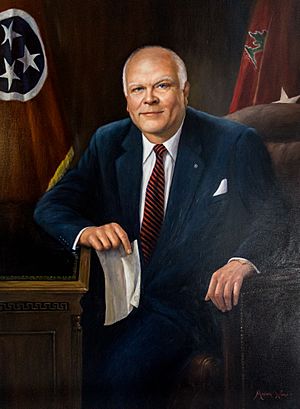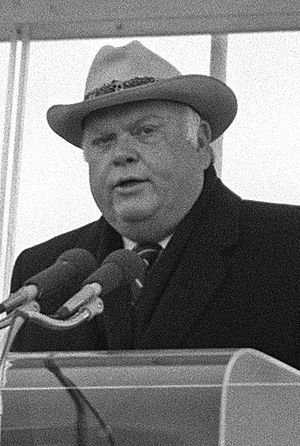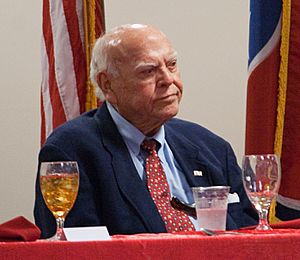Ned McWherter facts for kids
Quick facts for kids
Ned Ray McWherter
|
|
|---|---|
 |
|
| 46th Governor of Tennessee | |
| In office January 17, 1987 – January 21, 1995 |
|
| Lieutenant | John S. Wilder |
| Preceded by | Lamar Alexander |
| Succeeded by | Don Sundquist |
| 77th Speaker of the Tennessee House of Representatives | |
| In office January 20, 1973 – January 17, 1987 |
|
| Preceded by | James McKinney |
| Succeeded by | Ed Murray |
| Personal details | |
| Born | October 15, 1930 Palmersville, Tennessee, U.S. |
| Died | April 4, 2011 (aged 80) Nashville, Tennessee, U.S. |
| Resting place | Sunset Cemetery, Dresden, Tennessee |
| Political party | Democratic |
| Spouse |
Bette Jean Beck
(m. 1953; died 1973) |
| Residence | Cary Lawn |
| Occupation | Businessman, farmer |
| Military service | |
| Allegiance | |
| Branch/service | Tennessee National Guard |
| Years of service | 1947–1968 |
| Rank | Captain |
Ned Ray McWherter (October 15, 1930 – April 4, 2011) was an American businessman and politician. He served as the 46th Governor of Tennessee from 1987 to 1995. Before becoming governor, he was the Speaker of the Tennessee House of Representatives for 14 years. This was the longest time anyone had served as Speaker in Tennessee up to that point.
Contents
Early Life and Career
Growing Up in Tennessee
Ned McWherter was born in Palmersville, Tennessee, in Weakley County, Tennessee. His father, Harmon Ray McWherter, was a sharecropper, which means he farmed land owned by someone else and paid rent with a share of his crops. His mother was Lucille (Smith) McWherter. Ned grew up in a small community called Little Zion and went to a one-room schoolhouse.
In the early 1940s, his family moved to Ypsilanti, Michigan. His father worked in factories that made things for the war effort. In 1945, the family moved back to Dresden, Tennessee. There, his parents bought and ran the City Cafe for several years.
High School and Early Jobs
Ned went to Dresden High School. He was co-captain of the football team and president of the school's Future Farmers of America club. After high school, he tried to play college football at three different universities. However, he got a knee injury before each season, which ended his football dreams.
With his college athletic career cut short, Ned started working as a salesman for the Martin Shoe Company. He traveled to places like the Caribbean and Central America to find buyers for sandals. Later, in 1964, he started his own company, Volunteer Distributing, which sold Anheuser-Busch beer. Two years later, he opened the first nursing home in Dresden.
Military Service and Faith
Ned McWherter served in the Tennessee National Guard for 21 years, from 1947 to 1968. He retired with the rank of captain. He was also a member of the United Methodist Church.
Time in the Tennessee House of Representatives
Starting in Politics
Ned McWherter became involved in politics in the late 1950s. He helped with the campaign of Robert "Fats" Everett, who was running for Congress. In 1968, he was encouraged to run for the Weakley County seat in the Tennessee House of Representatives. He won without anyone running against him and was reelected eight more times, usually without opposition.
Becoming Speaker of the House
When McWherter first joined the House, state politics were a bit messy. Republicans had control of the House for the first time in many years. Then, Democrats regained control, but a Republican governor, Winfield Dunn, was elected. The Speaker of the House at the time, James McKinney, often disagreed with Governor Dunn.
In 1973, many Democratic lawmakers felt that McKinney's strong opposition was making it hard for the state to get things done. They suggested replacing him with McWherter. McWherter was chosen as the party's choice for Speaker by just one vote. Governor Dunn tried to get some Democrats to vote for a Republican, but it didn't work. McWherter was elected Speaker by a very close vote of 50-49.
Key Issues as Speaker
One of McWherter's first big challenges as Speaker was a bill in 1974. This bill wanted to create a medical school at East Tennessee State University in Johnson City, Tennessee. People in East Tennessee really wanted this school because there weren't enough doctors in their area. Governor Dunn, however, vetoed the bill, saying the medical school in Memphis was enough.
East Tennesseans felt this was unfair. The state senate voted to override the governor's veto. McWherter then led the House in overriding the veto as well, making the bill a law. This decision was very popular in East Tennessee. Years later, when Dunn ran for governor again, his lack of support for the medical school hurt his campaign.
Working with Governors
In 1976, McWherter supported Jimmy Carter for president. A funny story happened when a reporter, Sam Donaldson, called McWherter "a nobody." Years later, when President Ronald Reagan visited Tennessee, McWherter made sure Donaldson was not allowed into the state capitol.
In 1979, the outgoing Governor Ray Blanton was pardoning many prisoners, including murderers. There were concerns that he was selling these pardons. To stop this, McWherter and Lieutenant Governor John S. Wilder found a way for the new governor, Lamar Alexander, to be sworn in three days early. This prevented any more questionable pardons.
During the 1980s, McWherter worked well with Governor Alexander on important issues like bringing foreign businesses to Tennessee and improving education. McWherter's support was very important for passing the "Career Ladder" bill, which gave extra money to the state's best teachers.
Serving as Governor of Tennessee
Running for Governor
As the 1986 governor's race approached, Democrats needed a strong candidate. McWherter decided to run and won the nomination against other candidates. Republicans nominated former Governor Winfield Dunn.
Dunn's campaign tried to make McWherter seem like just a beer salesman from West Tennessee. But McWherter pointed out that Dunn also had business ties to places that sold alcohol. Dunn also didn't get support from a key congressman in East Tennessee, who was still upset about Dunn's veto of the ETSU medical school bill. McWherter campaigned hard, visiting all 95 counties in the state. On election day, he won the election.
First Term as Governor
During his first term, Governor McWherter made sure that all government meetings were open to the public and the press. This followed a "sunshine law" he had helped create earlier. He also started the "21st Century Schools" education program, which inspired similar programs in other states. His replacement of the Medicaid program with the TennCare system also got national attention.
One major challenge during his first term was a disagreement between Tennessee and North Carolina over the pollution of the Pigeon River. This river starts in North Carolina and flows into East Tennessee. People in East Tennessee said that a paper mill in North Carolina was dumping harmful chemicals into the river. They believed this hurt the river's potential for tourism and might be causing health problems.
The mill's town in North Carolina depended on the mill for jobs. The Environmental Protection Agency (EPA) told the mill to clean up its act. The company threatened to close the plant if they had to meet Tennessee's water quality rules. After visiting the mill town, Governor McWherter announced on Christmas Day, 1988, that he would not allow the mill to continue polluting the river.
Second Term and Later Years
McWherter was easily re-elected for his second term in 1990. A group he appointed suggested a state income tax, which is a very unpopular idea in Tennessee politics. McWherter didn't strongly support it, and the idea was eventually dropped.
In 1992, Senator Al Gore became Vice President, leaving an empty Senate seat. Governor McWherter appointed his deputy governor, Harlan Matthews, to serve as U.S. Senator until the next election. In 1994, Governing magazine named McWherter the nation's most outstanding governor.
After Being Governor
Ned McWherter could not run for a third term because of the state constitution. After his second term ended in 1995, President Bill Clinton appointed him to the Board of Governors for the United States Postal Service. McWherter continued to live in Tennessee and was very active in the Democratic Party.
In the 2010 governor's race, McWherter's son, Mike, ran for governor. Ned, who was 79 at the time, helped his son campaign. He even bought a red sports car to ride in campaign parades. However, his son lost the election.
Ned McWherter passed away on April 4, 2011, in Nashville, after being treated for cancer. Many important people, including former President Bill Clinton, spoke at his memorial service. McWherter is buried in Sunset Cemetery in Dresden.
Family and Lasting Impact
Ned McWherter married Bette Jean (Beck) McWherter in 1953. She passed away from cancer in 1973. His son, Michael Ray McWherter, is a businessman and once ran for governor. His daughter, Linda Ramsey, is a doctor of physical education.
McWherter helped fund the building of libraries at the University of Memphis and Middle Tennessee State University. Both buildings are named in his honor. The Weakley County Library in Dresden is also named after him. A bronze statue of Ned McWherter stands on the Weakley County Courthouse lawn. A building at the Quillen College of Medicine at East Tennessee State University is also named in his honor.
 | Bessie Coleman |
 | Spann Watson |
 | Jill E. Brown |
 | Sherman W. White |



